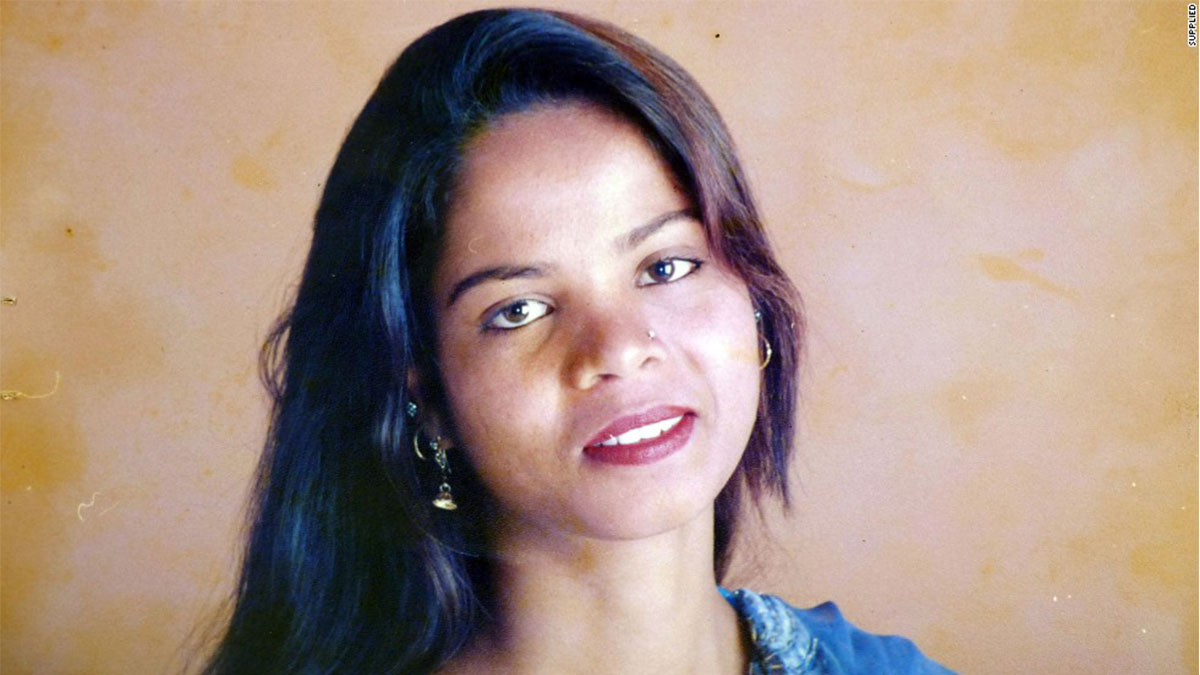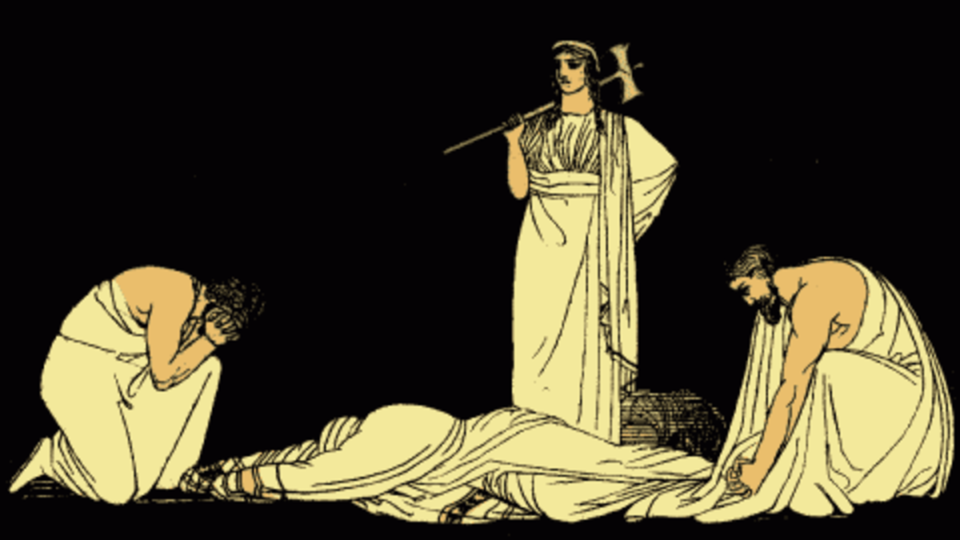- Legal Education and Access Portal
Mst. Asia Bibi v. The State etc. (Death Sentence for Blasphemy Quashed)
Date of hearing: 8.10.2018
Court: Supreme Court of Pakistan (Appellate Jurisdiction)
Name: Criminal Appeal No. 39-L Of 2015 (Mst. Asia Bibi v. The State etc.)
Judges Present: Mr. Justice Mian Saqib Nisar,
HCJ Mr. Justice Asif Saeed Khan Khosa,
Mr. Justice Mazhar Alam Khan Miankhel.
“I bear witness that there is no God worthy to be worshiped but Allah, and I bear witness that Muhammad is the Last Messenger of Allah”
The Chief Justice of Pakistan, Mian Saqib Nisar, gave the leading judgment with which Justice Asif Saeed Khan Khosa concurred while making additional remarks. The judgment began with the verse stated above, the Qalimah-e-Shahadat. This verse was termed to be the essence of Islam, the recitation of which makes one a Muslim. By reading the Prophet Muhammad’s (P.B.U.H.) name in together with Allah’s, the verse was said to evidence the importance and sanctity of the Prophet (P.B.U.H.) for Muslims.
The Islamic teachings on tolerance were then expanded upon which were called “the basic principle of Islam”, a religious and moral duty which relates to the dignity and equality of all human beings and the fundamental freedom of thought, conscience and belief. Chief Justice Nisar clarified that this did not require one to compromise one’s own beliefs or to forgo one’s own principles but instead, it meant that human beings were distinct in their appearance, speech, behaviour and values and this difference was accorded the protection to exist, by Islamic injunctions. Referring to religious freedom, the following verse of the Quran was quoted:
“There should be no compulsion in religion. Surely, the right way has become distinct from error.” [Al-Baqara (2:256)]”.
Therefore, Muslims are bound by this order and required to act accordingly.
Similarly, another integral facet of Islam was cited to be the love, admiration and adulation for the Prophet (P.B.U.H.) which was evidenced by verses of the Quran and Hadith (e.g. At Towbah (9:24), An-Najm (53:1-4)). The court stated that this love is required by Islam to manifest as unquestioning and unwavering obedience to the Prophet (P.B.U.H.) (Ali’Imran (3:31), [An-Nisa (4:65), Al-Ahzab (33:36)) and that this was accompanied by an injunction to strictly observe maximum respect for the Prophet (P.B.U.H.). It was according to this order that no direct or indirect disobedience of the Prophet (P.B.U.H.) was permitted and this prohibition was captured by section 295-C of the Pakistan Penal Code (PPC).
“295-C. Use of derogatory remarks, etc., in respect of the Holy Prophet: Whoever by words, either spoken or written, or by visible representation or by any imputation, innuendo, or insinuation, directly or indirectly, defiles the sacred name of the Holy Prophet Muhammad (peace be upon him) shall be punished with death, or imprisonment for life, and shall also be liable to fine.”
The Court condemned blasphemy and stated that it would not allow anyone to commit it and escape without consequences. However, it noted that this law had been used in the past by some to fulfil their personal malicious agendas by making false allegations of Blasphemy. This was evidenced by the existence of 62 known cases, since 1990, where people had been murdered pursuant to allegations of blasphemy, without the matter ever going to trial. The most recent example of this was cited to be the case of Mashal Khan, a student of Abdul Wali Khan University-Mardan, who had been lynched by a mob on the premises of his university, after he was alleged to have posted blasphemous content online. Similarly, the case of Ayub Masih was referred to, who was accused of blasphemy by his neighbour in 1996, following which he was arrested. Despite his arrest, his house and the houses of fourteen other Christian families were set ablaze due to which they were forced to leave the village. Ayub was also shot and injured in the sessions court and further attacked in jail. His trial concluded with him being convicted and sentenced to death, the appeal of which upheld by the High Court. On Appeal to the Supreme Court, it was discovered that the allegation had been made by the neighbour to usurp the land on which Ayub and his family were residing and he succeeded in doing so by misusing blasphemy laws. Ayub’s conviction was therefore set aside by the Supreme Court.
The Court noted that Islamic teachings prioritised human life and imposed strict penalties if the punishment of death is awarded to the innocent. The Court also stated that although punishments were prescribed by Islam, no one was to be killed or punished otherwise, unless (s)he is convicted by a fair trial in court. Awarding sentences of death or other punishments is only within the prerogative of the state, through its courts (section 28 Criminal Procedure Code 1989 (Cr.P.C.)) which enforce doctrines like due process (by virtue of article 4 of the Constitution of Pakistan) to ensure that false allegations of criminal activity are sifted to reach a just decision, in every case. No such parallel authority was bestowed upon any individual or group of persons besides the officials of the state.
Statements made in the case of Malik Muhammad Mumtaz Qadri Vs. the State (PLD 2016 SC 17)] were recalled where the court noted that since Blasphemy was considered to be such a heinous crime, its false allegations were therefore, equally “detestable besides being culpable” due to which, Islamic condemnation for both acts carried the same intensity. This made it a responsibility of the state to ensure that no innocent person was made to face false accusations of such an offence.
Facts of the Case
The Court then turned to examine the facts of the present appeal. Qari Muhammad Salaam (Complainant/PW.1), on 14.6.2009 registered an F.I.R. at Police Station Sadar- Nankana Sahib, where he stated that the appellant, Mst. Asia Bibi, a Christian, was plucking berries in the field belonging to Muhammad Idrees (CW.1) along with other Muslim ladies, including Mafia Bibi (PW.2), Asma Bibi (PW.3) and Yasmin Bibi (given up PW). She was alleged to have uttered remarks derogatory to the Prophet (P.B.U.H.) which was reported to the Qari (PW.1) by the other PWs. The Qari inquired about the incident from the appellant in a public meeting where she confessed her guilt.
An investigation which followed the F.I.R. resulted in the appellant being indicted, arrested and charged by the Addl. Sessions Judge, Nankana Sahib, based on the testimony of seven prosecution witnesses. The appellant maintained her innocence and denied the allegation levied against her. She termed them to be maliciously framed by the eye witnesses, resulting from a quarrel which occurred when she tried to fetch some water in the field which led to an exchange of “heated words”. However, the appellant did not record her statement under oath nor did she present any evidence to support her position.
Following this, the appellant was convicted on 08.11.2010 under sec. 295-C, sentenced to pay a fine of Rs 100,000/- and awarded the death penalty by the trial court. This was sent by the trial court to the High Court for confirmation and the Appellant subsequently challenged her conviction which was dismissed with her sentence being upheld.
The decision was subsequently appealed to the Supreme Court of Pakistan.
Merits of the Case
The Primary argument made by the counsel for the Complainant was that the appeal should be dismissed as the instant appeal was barred by 11 days. Given that the matter of an individual’s life was involved, the court decided to forgo technicalities and consider the appeal.
The Appellant submitted that the day on which she was alleged to have committed blasphemy, an altercation had occurred between her and the witnesses when she offered to fetch them water which they refused by stating that they would never accept water from a Christian. This resulted in an angry verbal exchange following which the witnesses conspired with the complainant to accuse her of Blasphemy, the F.I.R. for which was registered five days later. She stated that she was a forty year old uneducated woman who had lived her entire life in her ancestral village, where her family had been residing well before partition. Never before had she ever been heard to make such comments nor did she possess the requisite knowledge to make such comments about Islam or the Holy Prophet (P.B.U.H.). She further contested the confession she was alleged to have made by the complainant by stating that it was coerced as she had been forced before a group of people who were threatening to kill her. Her statement expressed complete respect for the Prophet (P.B.U.H.) and the Quran and she stated that she was wiling to swear on the Bible to prove her innocence, a request which had been denied by the Investigation Officer. Also, the F.I.R. had been registered against her without prior approval from the Provincial Government, as required by section 196 of the Cr.P.C..
In reviewing the matter, the court clarified the point regarding lack of permission mandated by section 196. While no such permission was required by for section 295-C, it was required by Section 156-A of Cr.P.C. that all relevant investigations must be carried out by the Superintendent of Police or officers above this rank. This rule had been violated as the investigation for the case has been carried out by a sub-inspector.
The complainant argued that since the appellant had committed the heinous crime of Blasphemy, she deserved no leniency. In response to the five day delay noted by the Court, between the occurrence of the offence and the registration of the F.I.R., the complainant stated that given the gravity and intensity of the situation, the delay was to verify the claims being made.
The appellant did not make a statement under oath in any of her previous hearings and did not produce any evidence in her defence. The Court noted that the prosecution’s entire case revolved around the statements made by two PW.s, Mafia Bibi (PW.2) and Asma Bibi (PW.3). Both these women were sisters and PW.3 was a student of the Qari’s (complainant) wife. The sisters did not show up in court and besides their statements there was no evidence of the occurrence. The statements which were made by them and all the other witnesses of the prosecution were inconsistent and did not corroborate each other in details regarding if the quarrel (between the convict and the two sisters) took place or not (the sisters denied the quarrel’s occurrence while the investigation officer and the owner of the fields affirmed it), when and where the incident was reported to the complainant (up to four different locations were provided), the number of people present at the time of reporting (this varied from 100-2000 people), how the convict was brought to the public hearing (she either came herself or was forced by a group of people or by other individuals), the location and time of this hearing where the convict was said to have made her confession (three different locations were given), the process of registering the F.I.R. for this case and the process by which the convict was arrested.
Both PW.2 and PW.3 denied in their statements that a quarrel had taken place the day they witnessed the convict making blasphemous statements or that they testified against her motivated by a fight. But Muhammad Idrees (CW.1), in his examination admitted that a quarrel had taken place between the PW.s and the convict and that he had been informed about this quarrel when he reached his field on the day the offence occurred. This was further affirmed by the testimony of the investigation officer following which it was established that the quarrel had in fact taken place. Justice Khosa noted that the Qari (complainant) and the two sisters (PW.2 and PW.3) had not only removed this from their testimony but also omitted the fact that they had also insulted the religious sensitivities of the accused. This coupled with other discrepancies rendered them capable of deposing falsely.
Justice Khosa stated that the injunctions of Islam required Muslims to believe in all prophets of Allah, which included Jesus Christ (Peace Be Upon Him) and all the books revealed by Allah, including the Bible, which made insults regarding the appellant’s religion by the two sisters, no less blasphemous (Surah Al-An’am: verse 108). He also referred to the covenant made by the Prophet (P.B.U.H.) with a delegation from St. Catherine’s Monastery (the world’s oldest monastery) in 628 A.D whereby which all Christians were, without any fee or other conditions, promised freedom of religion, work, security of person and the right to property, till the Last Day. The honourable judge noted that while speaking of the sacred concept of Namoos-e-Risalat (Honour and Dignity of the Prophet (P.B.U.H.)), this covenant had not been adhered to by the Muslims in the present case.
The leading judgment pointed out that the F.I.R. noted there to be 25-30 witnesses (besides PW 2 and 3) of the remarks made by the convict but none of these reported the matter the matter to anyone, besides a female named Yasmin Bibi who refused to make an official statement as a witness.
Another piece of evidence instrumental to the case against the convict was her confession which not only had been disregarded by the High Court (as it was missing details like date, time, mode of commissions etc.) but was also in violation of article 37 of the Qanun-e-shahadat as the convict alleged it to have been coerced and this was further evidenced by the fact that she was presented alone, before an angry crowd, where it was inevitable for her to feel threatened. Even if this had not been the case, the Supreme Court’s jurisprudence did not allow such confessions to be the sole material evidence on which the entire case resulting in capital punishment could rest.
The court also distinguished the principle that ‘the part of a statement which remains unrebutted amounts to an admission’, as it did not apply in criminal prosecutions, following which it declared the High Court to have erred in Law in reaching its decision.
All this was termed by the court to cast serious doubts on the prosecution’s case which entitled the convict the benefit of doubt (Tariq Pervaiz Vs. The State (1995 SCMR 1345) and Ayub Masih vs The State (PLD 2002 SC 1048)). Since the onus to prove its allegations, beyond reasonable doubt, rested on the prosecution, it needed to rebut the presumption of innocence accorded to the accused, which the court termed to be a core principle of the criminal justice system. Such principles could not be ignored no matter how strong the suspicion as these were instrumental to the conveyance of justice and the establishment of the truth. Also, it was stated that if the PWs were found to be inimical towards to accused, she deserved to be acquitted on the principle of the benefit of doubt.
Justice Khosa summarised his position on the case by stating that the facts and the evidence present indicated that after an altercation took place in the Falsa fields between the convict an the two witnesses, in the five days that followed, a false story had been concocted by the witnesses and the complainant, whereby which they had disregarded the commands of Allah regarding Justice and Honesty (Surah Al-Nisa: verse 135, Surah Al-Baqarah: verse 42). Even if there was some truth to this story, it had been mixed with a lot which was untrue and this made it appear to Justice Khosa that Asia Bibi, the Appellant, was in the words of Shakespeare’s King Lear, “more sinned against than sinning”.
Based on these arguments, the court termed the Prosecution to have ‘categorically failed’ to prove its case against the accused beyond reasonable doubt, following which it reversed the conviction of the appellant, quashed her death sentence and acquitted her of the charges made against her.
The judgment ended with the following Hadith:
“Beware! Whoever is cruel and hard on a non-Muslim minority, or curtails their rights, or burdens them with more than they can bear, or takes anything from them against their free will; I (Prophet Muhammad) will complain against the person on the Day of Judgment.” (Abu Dawud)



